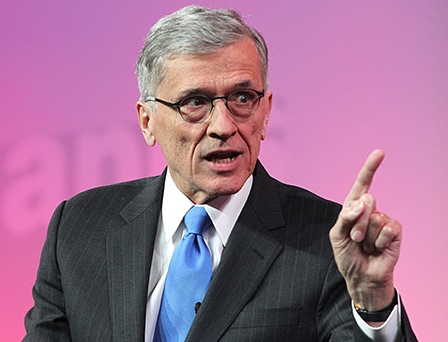Studios: Any FCC Licensing Involvement in Set-Tops Is Untenable

The smarter way to stay on top of broadcasting and cable industry. Sign up below
You are now subscribed
Your newsletter sign-up was successful
Some Hollywood heavy hitters want the FCC to know that they remain strongly opposed to the app-based set-top proposal FCC chairman Tom Wheeler introduced last week.
That is according to a letter filed with the FCC in the wake of an FCC oversight hearing in the Senate Commerce Committee Thursday.
"In response to testimony at [the] FCC Oversight Hearing before the Senate Commerce Committee, the undersigned collectively write to clarify for the record that the undersigned always have been – and remain – strongly opposed to any licensing construct in which the Commission has the ability to alter the provisions contained in any license that permits the distribution of copyrighted video programming," they wrote.
The undersigned being Disney, 21st Century Fox, Time Warner, Viacom and Scripps.
The studios did not specify what they were responding to, but in answer to a question from Sen. Claire McCaskill (D-Mo.) about copyright licensing and what the FCC's authority was, Wheeler defended the FCC’s approach to copyright protections. “What the commission is trying to do,” he said, “is not to write copyright policy, but to write a policy inside its authority which does not interfere with existing copyright authority and with the contractual terms that copyright holders do inside that authority." He added: "We worked for months with the copyright holders to try and find the way to do that. We're probably 90% there."
Clearly the copyright holders are on a different page.
"[I]n order to ensure that there is no confusion about our position, the Content Companies once again urge the Commission not to adopt any proposal that includes any FCC involvement in the licensing process or that grants the FCC any ability to establish the terms and conditions of a license related to the distribution of content."
The smarter way to stay on top of broadcasting and cable industry. Sign up below
An FCC source speaking on background said that by making programmers part of the licensing body, they have a direct say in how the video navigation apps are licensed to third parties and so it would be tough to believe such a licensing body would create a process that does not protect copyrights. They said that licensees will get access to the content only after agreeing not to alter it or the advertising in it.
They said the FCC will have no role or authority over the agreements between the programmers and pay-TV providers but will only review the license to ensure it is not "unreasonable" or does not stifle competition.
But clearly the programmers see the authority to change those contracts based on the FCC's reading of what is reasonable or competitive as too intrusive.
Contributing editor John Eggerton has been an editor and/or writer on media regulation, legislation and policy for over four decades, including covering the FCC, FTC, Congress, the major media trade associations, and the federal courts. In addition to Multichannel News and Broadcasting + Cable, his work has appeared in Radio World, TV Technology, TV Fax, This Week in Consumer Electronics, Variety and the Encyclopedia Britannica.

